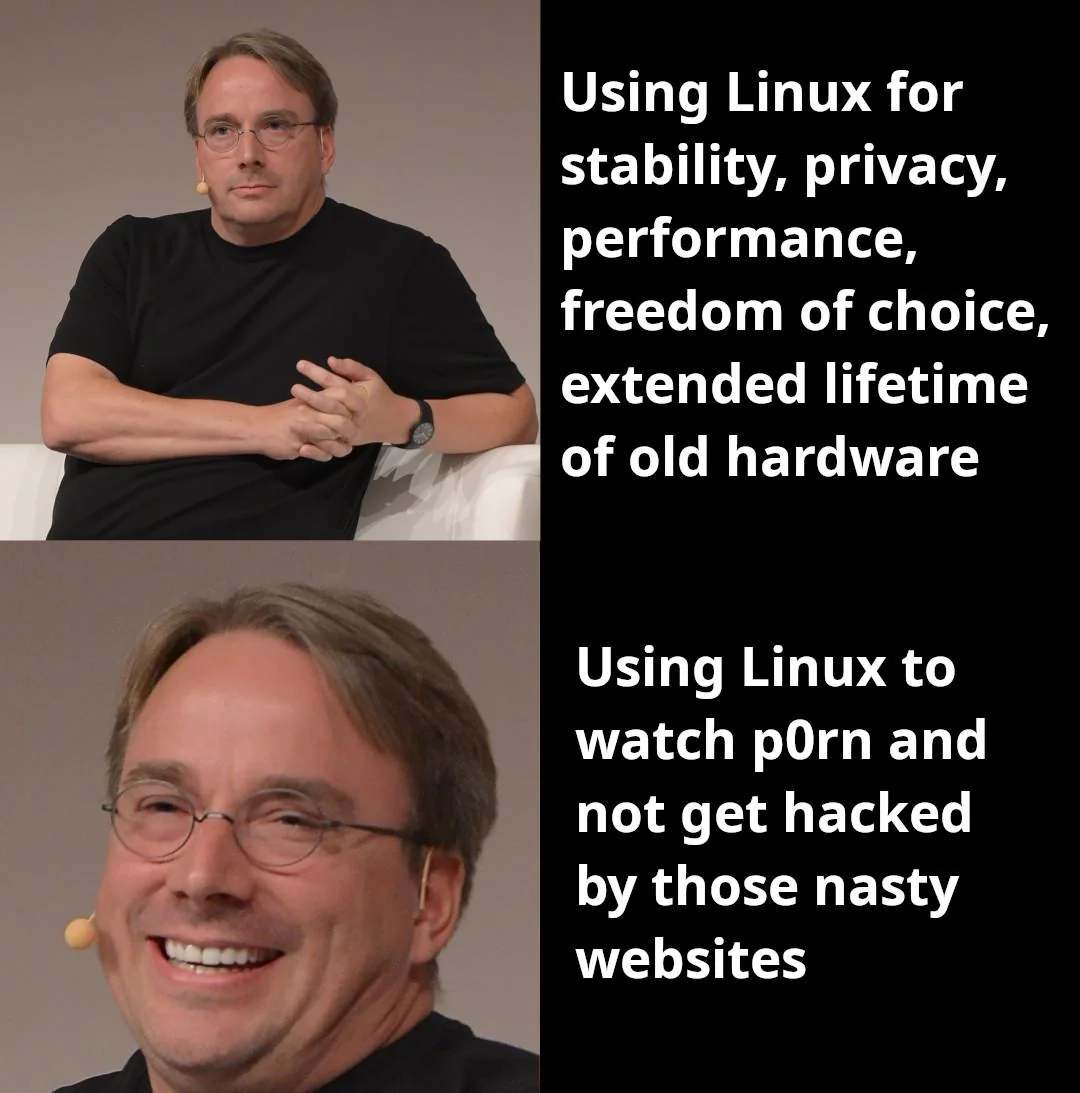this post was submitted on 15 Apr 2024
658 points (95.3% liked)
linuxmemes
25669 readers
1397 users here now
Hint: :q!
Sister communities:
Community rules (click to expand)
1. Follow the site-wide rules
- Instance-wide TOS: https://legal.lemmy.world/tos/
- Lemmy code of conduct: https://join-lemmy.org/docs/code_of_conduct.html
2. Be civil
- Understand the difference between a joke and an insult.
- Do not harrass or attack users for any reason. This includes using blanket terms, like "every user of thing".
- Don't get baited into back-and-forth insults. We are not animals.
- Leave remarks of "peasantry" to the PCMR community. If you dislike an OS/service/application, attack the thing you dislike, not the individuals who use it. Some people may not have a choice.
- Bigotry will not be tolerated.
3. Post Linux-related content
- Including Unix and BSD.
- Non-Linux content is acceptable as long as it makes a reference to Linux. For example, the poorly made mockery of
sudoin Windows. - No porn, no politics, no trolling or ragebaiting.
4. No recent reposts
- Everybody uses Arch btw, can't quit Vim, <loves/tolerates/hates> systemd, and wants to interject for a moment. You can stop now.
5. 🇬🇧 Language/язык/Sprache
- This is primarily an English-speaking community. 🇬🇧🇦🇺🇺🇸
- Comments written in other languages are allowed.
- The substance of a post should be comprehensible for people who only speak English.
- Titles and post bodies written in other languages will be allowed, but only as long as the above rule is observed.
6. (NEW!) Regarding public figures
We all have our opinions, and certain public figures can be divisive. Keep in mind that this is a community for memes and light-hearted fun, not for airing grievances or leveling accusations. - Keep discussions polite and free of disparagement.
- We are never in possession of all of the facts. Defamatory comments will not be tolerated.
- Discussions that get too heated will be locked and offending comments removed.
Please report posts and comments that break these rules!
Important: never execute code or follow advice that you don't understand or can't verify, especially here. The word of the day is credibility. This is a meme community -- even the most helpful comments might just be shitposts that can damage your system. Be aware, be smart, don't remove France.
founded 2 years ago
MODERATORS
you are viewing a single comment's thread
view the rest of the comments
view the rest of the comments

There's always a risk of JavaScript breaking out of the sandbox and crap like that. Browser vendors do their best to protect against things like that but security is often a trade-off for speed and people like fast software, not to mention browsers are huge and complex and they're going to have vulnerabilities. A browser's whole job is to execute remote untrusted code, do you trust it that much to be flawless?
...... I mean, I don't but I use it anyway so ¯\_(ツ)_/¯
Linux security noob here but can't you just run the browser in a chroot with everything isolated?
Yeah, that should work too... but you don't get to see any of your local files...
Made a Nix library for this. For a simple setup you can just build this (untested) and run the result:
It doesn't have user isolation yet, so if it escapes the browser and the chroot (which doesn't have a
/procunless you setproc = /proc;, and runs in a PID namespace either way) your files are still at risk. However, this is still pretty secure, and you can run the script itself as a different user (it creates a new UID namespace so chrooting can be done without root).I mean, yeah, sure. But at this point, if that’s really a worry, one should not trust any sandbox. OSes are huge and complex and will have vulnerabilities too. Hell, there could be a xz level backdoor currently in the wild and nobody knows any better lol
Right, that's where OP comes in - most malware will be made for Windows, so if you visit such a malicious website, it'll likely be inert under Linux!
.... I'm not saying this is a great reason to use Linux, but there's at least a little bit of merit to it.